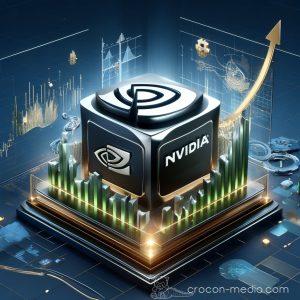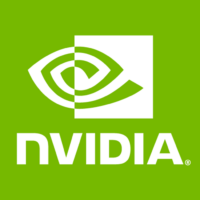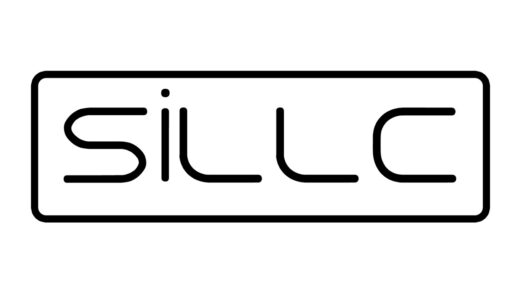October 20, 2024 [crocon media – msc] A New Era for AI, with Nvidia Leading the Charge
As artificial intelligence continues to evolve, large language models (LLMs) like OpenAI’s GPT-4 and large quantum models (LQMs) are redefining the future of computation. This report tries to examine the advantages and challenges of these two powerful paradigms, and why companies like Nvidia are poised to dominate the next decade of AI development, particularly with LQMs.

LLMs: Powering the Present
LLMs have revolutionized natural language processing (NLP), providing state-of-the-art solutions for language understanding, generation, and translation. They are already being deployed across industries, from customer service bots to code generation and drug discovery.
Advantages:
- Wide Accessibility: LLMs are well-integrated into cloud infrastructures, allowing businesses to quickly adopt them.
- Scalability: With enough compute resources, LLMs can handle increasingly complex tasks across languages and domains.
- Customization: Fine-tuning models like GPT for specific industries has empowered companies to build domain-specific applications.
However, LLMs also have drawbacks:
- Energy Intensive: Training and running large models requires significant energy consumption.
- Data Hunger: LLMs rely on massive datasets, making them prone to biases inherent in large-scale data scraping.
- Computation Costs: The high cost of scaling models is a growing concern, especially for smaller firms that cannot match the compute resources of tech giants.
 LQMs: A Glimpse into the Future
LQMs: A Glimpse into the Future
Large Quantum Models (LQMs) are emerging as a promising frontier, with the potential to solve some of the computational bottlenecks faced by classical models. Quantum computing offers exponentially faster processing for certain tasks, making it well-suited for complex problem-solving beyond the capacity of today’s best GPUs.
Advantages:
- Exponential Speed: Quantum processors leverage quantum mechanics principles like superposition and entanglement to process information at speeds unreachable by classical computers.
- New Problem-Solving Paradigms: Problems like optimization and simulation (e.g., for drug discovery or material science) that overwhelm classical computers could be tackled efficiently by LQMs.
- Lower Energy Consumption: While LQMs are still in their early stages, quantum computing could dramatically reduce the energy required for AI computations by solving certain problems in fewer steps.
However, the challenges of LQMs are significant:
- Hardware Maturity: Quantum computers are still in the nascent stage, with noise, decoherence, and error correction being major hurdles.
- Cost: Quantum computing infrastructure is still expensive and difficult to scale.
- Skill Gap: The specialized knowledge required to develop quantum algorithms limits widespread adoption in the short term.
 Why Nvidia’s Future Looks Bright with LQMs
Why Nvidia’s Future Looks Bright with LQMs
Nvidia has long been at the forefront of AI innovation, dominating the GPU market, which serves as the backbone for training LLMs. Its GPUs have enabled breakthroughs in deep learning and large-scale model training. Looking ahead, Nvidia’s investments in quantum computing signal a new era where the company could lead in LQM development, creating an ecosystem that supports both LLMs and LQMs.
Key reasons why Nvidia is positioned for success with LQMs:
- Hybrid Architectures: Nvidia is working on hybrid quantum-classical architectures that blend the strengths of both paradigms, providing flexibility for various workloads. This ensures that Nvidia can continue to serve industries even as quantum computing matures.
- Software Ecosystem: Nvidia’s CUDA and quantum software libraries are setting the stage for integrating quantum capabilities into mainstream applications. As LQMs develop, Nvidia’s tools and platforms will be critical for scaling their adoption.
- Collaborations: Nvidia has partnered with quantum computing firms, including Qubits by Rigetti and IBM’s Qiskit, fostering synergies that accelerate quantum hardware and software innovation.
“Soon”, maybe in the next decade, LQMs will likely take over where classical AI models fall short—handling massive datasets with complex, non-linear interactions, and creating models capable of solving intractable problems like climate modeling and global optimization challenges. Nvidia’s forward-thinking strategy will make it a crucial player in this emerging field.
As the AI landscape shifts from LLMs to the quantum-driven future of LQMs, Nvidia is poised to lead this transition with its investments in quantum computing and its ability to develop hybrid systems. The future of AI is not limited to more powerful classical models but lies in integrating quantum and classical approaches for next-generation problem-solving.
For more in-depth explorations of this topic, please also refer to the following resources:
- “Nvidia’s Quantum Computing Roadmap: How GPUs and Quantum Will Coexist” – https://www.nvidia.com/quantum-roadmap
- “The Future of AI: LQMs and their Impact on Quantum and Classical Systems” – https://www.sciencedirect.com/ai-quantum-future
- “How Quantum AI Could Transform Industries” – https://www.quantum-computing-insights.com/transform-industries
Read Nvidia’s latest press releases : https://nvidianews.nvidia.com/news/

Editorial Disclosure: The editorial content on this page is not provided by any entity mentioned herein. Opinions expressed here are the author’s alone, and have not been reviewed, approved or otherwise endorsed by any of these entities.
Disclaimer: The author(s) of this article may or may not hold a position in the mentioned stock. None of the companies discussed in the above article have paid for this content. The information provided in this article should not be considered financial advice, and readers should always do their own research before making investment decisions. However, as with any investment, there are potential risks and uncertainties to consider, such as potential regulatory changes, market volatility, and competition from other players in the industry. It is important for investors to carefully monitor this stock and its performance over time to make informed decisions about their investments. crocon media is a project of The SiLLC Assembly. This site is for entertainment purposes only. The owner of this site is not an investment advisor, financial planner, nor legal or tax professional and articles here are of an opinion and general nature and should not be relied upon for individual circumstances. This article is for informational purposes only and should not be considered financial advice. Investing in stocks involves risk, and readers should conduct their own research and consult with a qualified financial advisor before making any investment decisions.



